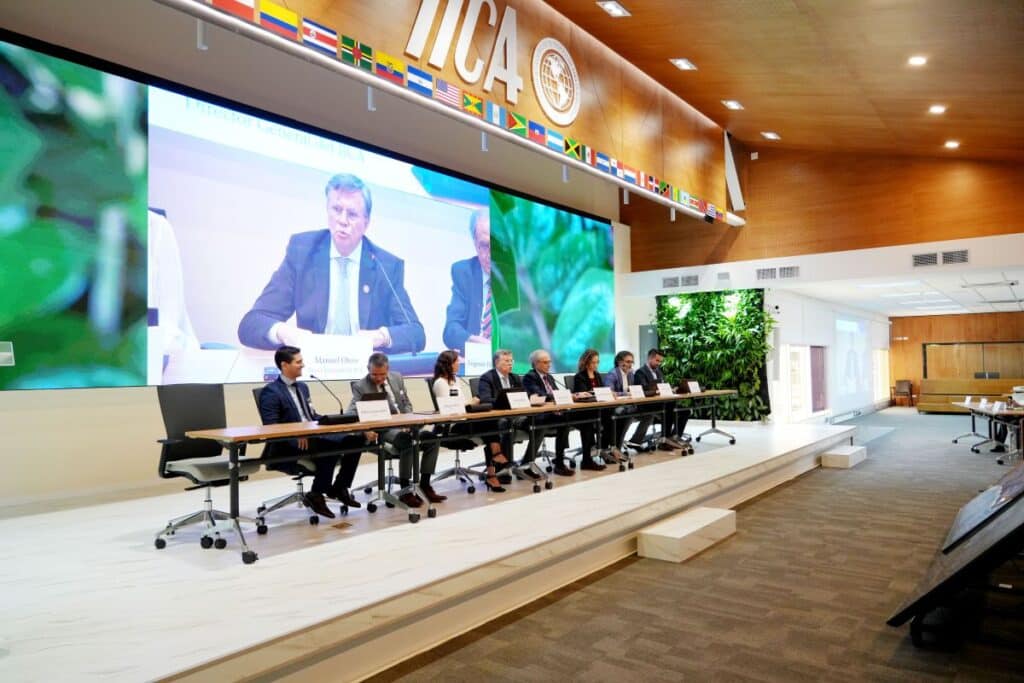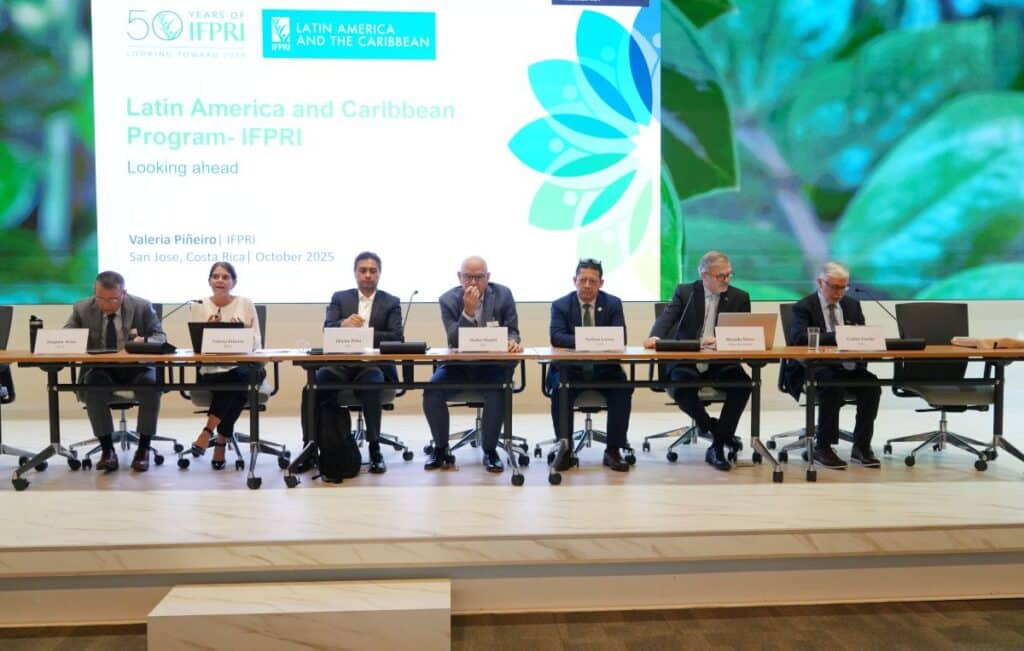
San José, 13 October 2025 (IICA). Latin America and the Caribbean (LAC) has the opportunity to transform its agrifood systems by adopting more sustainable, inclusive, and resilient models; but achieving this calls for coherent policies, institutional and technological innovation, improved governance and broad multisectoral collaboration.
This was the conclusion reached by a group of experts during the panel discussion Transforming Food Systems in LAC: from Lessons to Action, organized as part of the hemispheric dialogue Transformative and Scalable Experiences for a New Generation of Public Policies for Agrifood Systems, held at the Headquarters of the Inter-American Institute for Cooperation on Agriculture (IICA) in Costa Rica.
The participants in the high-level activity were Joaquín Arias, Coordinator of IICA’s Observatory of Public Policy for Agrifood Systems (OPSAa); Pedro Martel, Head of the Environment, Rural Development and Disaster Risk Management Division of the Inter-American Development Bank (IDB); Héctor Peña, an economist from the World Bank; Nelson Larrea, Senior Executive of the Private Sector Programming Directorate of CAF-Development Bank of Latin America and the Caribbean; Ricardo Marra, President of the Buenos Aires Grain Exchange; and Carlos Furche, Director of Chile’s Agricultural Research Institute (INIA).
The moderator of the event, which was one of activities held to commemorate the 50th anniversary of the International Food Policy Research Institute (IFPRI), was Valeria Piñeiro, the organization’s Regional Representative for LAC and Senior Research Coordinator of the Markets, Trade and Institutions Unit.
The discussion focused on how the evolution of food systems over the past 50 years has impacted the challenges and opportunities for LAC; the vision for the region’s food systems for the year 2030 and beyond; which policy interventions and institutional innovations have demonstrated the greatest potential to have an impact, and how they can be scaled or adapted to diverse country contexts; and how governments, civil society and the private sector cancollaborate more effectively to translate long-term visions into viable coordinated strategies.
“In order to transform agrifood systems, we must align objectives, instruments and financing, and do so in a collaborative, coherent way”, said IICA’s Joaquín Arias, emphasizing the importance of making agrifood policies more coherent by adopting a “systems approach that integrates the economic, social and environmental aspects of the economy”. He also highlighted the value of intersectoral dialogue and the generation of regional public goods such as data and indicators to promote better policies.
The IDB’s Pedro Martelunderlined the importance of investing in knowledge, public governance and technological development to strengthen agrifood policies, noting that such “low-cost, high-impact” actions generate information, analysis and institutional capabilities that are critical for addressing the challenges facing the sector.
“Investing in governance and information systems is not an expenditure, but rather an essential investment to ensure that policies benefit all the stakeholders in the economy”, he observed.
The World Bank’s Héctor Peña suggested the need for country-specific agrifood policies that integrate small farmers, promote sustainability and development, and include financial inclusion and risk mitigation tools. “We cannot think about transforming agrifood systems without including the people who produce most of our food”, he remarked, also stressing that building trust in public institutions should also be a high priority.
Nelson Larrea, from CAF-Development Bank of Latin America and the Caribbean, also emphasized the importance of channeling financing to producers through agricultural and development banks, leveraging technology and innovation¾such as digitalization, artificial intelligence and carbon markets¾to improve financial inclusion and the efficiency of agricultural credit.
“It is essential to modernize development banks in order to better reach those with least access to the financial sector, and generate real development opportunities”, Larrea said, stressing the need for countries to support such initiatives.

Ricardo Marra, President of the Buenos Aires Grain Exchange, highlighted the role of the private sector and producers in strengthening agricultural market transparency and predictability; he also underlined the importance of generating objective information, institutionalizing competitive markets, and promoting consensus among the various actors in the production chain.
“When large, medium and small-scale producers have access to the same price and market information, it improves decision-making and the sector’s sustainability”, he suggested.
Carlos Furche, the Director of Chile’s INIA, closed the panel discussion arguing that the transformation of agrifood systems must begin with efforts to strengthen the productive base¾agriculture and its natural resources¾, especially water and soil, and the adoption of policies that promote their sustainable use, strengthen animal and plant health, drive the digitalization of the sector, and generate conditions that foster investment.
“The future of agriculture requires modern governance, research, innovation and the constant evaluation of public policies”, he concluded.
Strengthening science and evidence-based policies
During the special session held to celebrate IFPRI’s 50th anniversary, IICA Director General Manuel Otero emphasized the essential role of knowledge, scientific evidence and international cooperation in transforming agrifood systems in LAC.
He also expressed appreciation for IFPRI’s role as a key partner in the effort to understand and transform food policies at the global level, recognizing its five-decade track record of generating scientific evidence to guide public policy decisions.
“At IICA,we are totally on board with IFPRI’s view that the transformation of agrifood systems calls for evidence-based policies, sustained investments in innovation and inclusive governance. We reaffirm our commitment to continuing to build bridges between science and politics, between research and action, which must translate into more coherent, coordinated and transformative public policy decisions”, Otero remarked.
IFPRI Director General Johan Swinnen mentioned that today, 50 years after the Institute’s founding, it faces “a more complex set of challenges”, such as “persistent inequalities, climate risks and political and economic volatility”, but that, with the same spirit of collaboration that led to its creation, it will continue to work with its partners to realize their “joint commitment to eradicating hunger and malnutrition”.
“Together, we can chart a path toward sustainable, inclusive and resilient food systems for LAC and the world. Latin America and the Caribbean is a critical player in global food security and environmental sustainability; its agrifood sector provides livelihoods and economic development across the region, benefiting many”, Swinnen said. IFPRI, based in Washington, D.C., and a member of the CGIAR consortium, is a global leader in applied research on food,agriculture and rural development. Since its creation in 1975, it has collaborated closely with governments, international organizations and research centers to strengthen food security and the sustainability of agrifood systems
More information:
Institutional Communication Division.
comunicacion.institucional@iica.int











